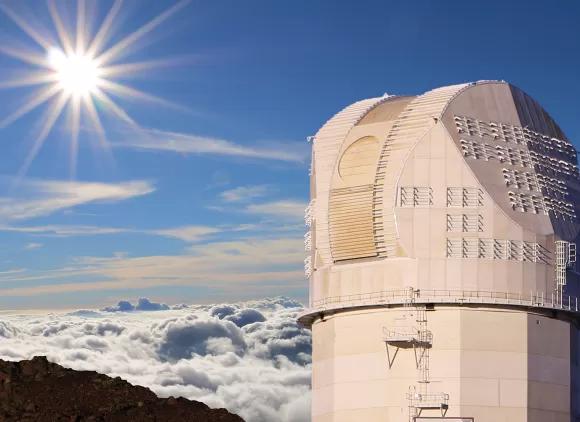Synopsis
NSF's National Solar Observatory (NSO) makes available to qualified scientists the world's largest collection of optical and infrared solar telescopes and auxiliary instrumentation for observation of the solar photosphere, chromosphere, and corona. The mission of the NSO is to advance knowledge of the Sun, both as an astronomical object and as the dominant external influence on Earth, by providing forefront observational opportunities to the research community. NSO operates observational facilities, develops advanced instrumentation both in-house and through partnerships, conducts solar research, and carries out educational and public outreach.
As NSF's Federally Funded Research and Development Center for solar physics, NSO is headquartered on the campus of the University of Colorado, Boulder and provides leadership to the solar community through management of the construction of the Daniel K. Inouye Solar Telescope (DKIST). When completed, DKIST will be the world’s most powerful solar observatory. Life on Earth is critically dependent upon the Sun. Solar phenomena such as space weather (e.g. geomagnetic storms) can significantly impact our increasingly technological society. DKIST will investigate the structure and evolution of magnetic structures on the Sun on spatial scales of tens of kilometers, the fundamental length scales of the processes that drive space weather. With DKIST poised to answer fundamental questions in solar physics by providing transformative improvements over current ground-based facilities, solar research enabled by DKIST will benefit all of humankind. NSO also operates a coordinated worldwide network of six telescopes known as the Global Oscillations Network Group (GONG). GONG was specifically designed to study solar oscillations, however, it has become a critical component to U.S. efforts to study, characterize and predict space weather. NSO routinely provides detailed synoptic solar data used by individual researchers and other government agencies.
NSO is managed for NSF by the Association of Universities for Research in Astronomy, Inc. (AURA).
Program contacts
|
Carrie E. Black
|
cblack@nsf.gov | (703) 292-2426 | MPS/AST |



